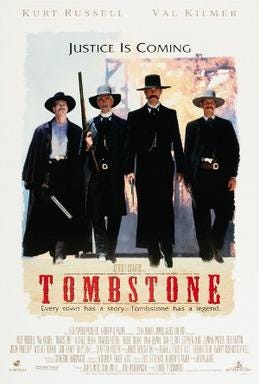Everyone Needs a Huckleberry
ASK Recommends: Tombstone (1993)
Tombstone. Directed by George P. Cosmatos, featuring Kurt Russell, Val Kilmer, Michael Biehn, Powers Booth, Dana Delaney, Sam Elliott, and Bill Paxton. Hollywood Pictures, 1993.
Oh, make no mistake. It’s not revenge he’s after. It’s a reckoning. – Doc Holliday (Val Kilmer)
The story of the shootout at the O. K. Corral is an old one. It’s been retold in countless Westerns. But standing head and shoulders above them is Tombstone. Kurt Russell’s believable performance as Wyatt Earp, coupled by Val Kilmer’s phenomenal portrayal of Doc Holliday, make this 1993 version an incredible movie.
Tombstone does not portray the wild west gunslinger lifestyle as something glamorous and desirable. Throughout the film, Wyatt Earp tries to explain to people how it doesn’t matter if you’re on the side of the Law, or living as an outlaw, killing leaves permanent scars. And someone will always be faster than you. The scene leading up to the O. K. Corral is rife with Wyatt’s guilt as he tries to talk his youngest brother out of going to the fight.
In all that time workin’ those cow towns, I was only ever mixed up in one shootin’, just one! But a man lost his life and I took it! You don’t know how that feels, and believe me boy, you don’t ever want to know. Not ever!
Of course, his brothers Morgan and Virgil won’t back down. They believe that there is something more important than the feelings Wyatt describes. Virgil makes it clear when he takes the Sheriff position that Wyatt declined that you can’t run away from doing what you think is right. And that is what really separates Tombstone from many Westerns: Wyatt Earp tries throughout the whole movie to run away from what’s right. He ignores everything he can. And it costs him more than he could have ever imagined. Wyatt eventually becomes the rider upon the pale horse whose name is Death. He emerges to bring judgment upon the lawless as he tells Ike Clanton, “and Hell’s coming with me!”
Justice versus revenge is not a new concept, but Tombstone wrestles with it in a superb manner. Revenge would have only brought more guilt upon Wyatt and would have gotten him killed. Wyatt isn’t completely aware of this, although Doc certainly is.
Wyatt Earp: What makes a man like Ringo, Doc? What makes him do the things he does?
Doc Holliday: A man like Ringo has got a great big hole, right in the middle of him. He can never kill enough, or steal enough, or inflict enough pain to ever fill it.
Wyatt Earp: What does he need?
Doc Holliday: Revenge.
Wyatt Earp: For what?
Doc Holliday: Bein’ born.
Doc contrasts Ringo and Wyatt here, further illustrating the distinction between justice and revenge. Thus Doc, knowing Wyatt will go to fight Ringo because that’s what is morally right, steps in for Wyatt. Doc confronts Ringo (who is not happy about the switch because his revenge lust is for Wyatt) and eliminates any temptation for Wyatt to be consumed by vengeance. Wyatt, in the end, cannot become like Ringo because someone interceded for him.
While the main idea of the film is the contrasts between revenge and justice, there are smaller side themes that erode at the crux of the film. Wyatt’s obsession with the actress who plays the Devil unfortunately gets the standard Hollywood treatment of “Romance will save us all” to wrap everything up nice and neat.
A “reckoning” is something that is best described as a settlement of a debt. And Wyatt is incapable of collecting on the debt he is trying to extract from the outlaw band, the Cowboys. Trying to will cost him his life, until someone more capable intercedes for him. While Doc Holliday is by no means a complete Christ figure in the film, at the moment when it matters most, he fulfills his role superbly.
The movie is by no means flawless and contains language and violent scenes which might be a bit much for some viewers. But the movie does a respectable job of capturing some key qualities to real life and uses that to succeed in making the story about something more than a glorified sheriff. Not a movie I would recommend to all viewers, but certainly to anyone who can handle the minor flaws in the film. It’s an imperfect film, but there is Truth in it. The director’s handling of the theme of justice versus revenge is well done and should give anyone who watches it something to think about.



